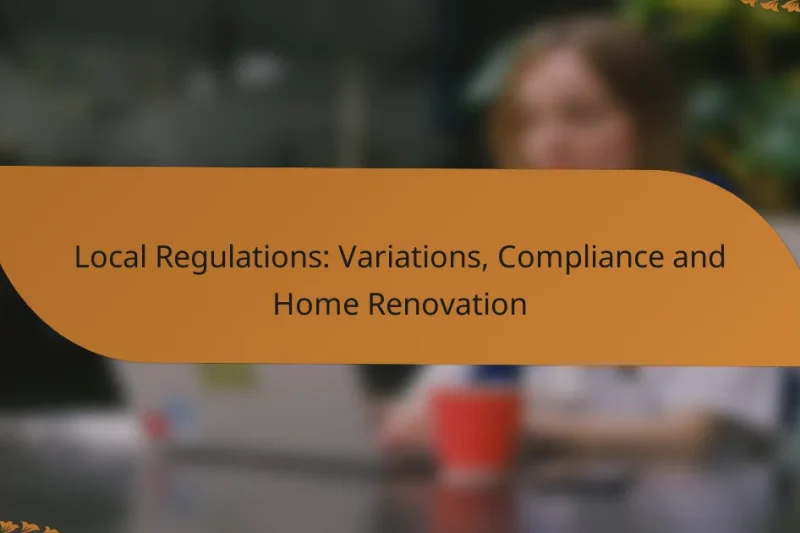Home renovation projects can often exceed initial budgets, leading to unexpected financial strain for homeowners. Understanding … Home Renovation Cost Overruns: Metrics, Causes and SolutionsRead more
Home renovation can transform your living space, making it more functional and aesthetically pleasing. In Los Angeles, popular projects range from kitchen and bathroom upgrades to energy-efficient renovations, each designed to cater to specific homeowner needs. Selecting the right contractor is crucial for ensuring a successful renovation, while understanding the associated costs will help you budget effectively for your project.
Home Renovation Budget: First-Time Homeowner Strategies
Embarking on a home renovation journey as a first-time homeowner can be both exciting and daunting, … Home Renovation Budget: First-Time Homeowner StrategiesRead more
Natural vs Synthetic Materials: Cost Comparison and Value
When comparing natural and synthetic materials, cost plays a crucial role in decision-making, influencing both initial … Natural vs Synthetic Materials: Cost Comparison and ValueRead more
Inspections: Importance, Types and Homeowner Responsibilities
Inspections play a vital role in maintaining the safety and value of a property, particularly in … Inspections: Importance, Types and Homeowner ResponsibilitiesRead more
Home Renovation: Waste Reduction Strategies, Efficiency and Environmental Impact
Home renovation presents an opportunity to implement effective waste reduction strategies that minimize material waste and … Home Renovation: Waste Reduction Strategies, Efficiency and Environmental ImpactRead more
Eco-Friendly Renovation Budgeting: Costs, Savings and Benefits
Budgeting for eco-friendly renovations is essential for homeowners looking to enhance their living spaces while being … Eco-Friendly Renovation Budgeting: Costs, Savings and BenefitsRead more
Specialized Contractors: Types, Expertise and Availability
Specialized contractors play a vital role in the construction and maintenance sectors, offering expertise across various … Specialized Contractors: Types, Expertise and AvailabilityRead more
Local Regulations: Variations, Compliance and Home Renovation
When undertaking home renovations, it’s essential to navigate local regulations that can vary significantly by location. … Local Regulations: Variations, Compliance and Home RenovationRead more
Home Renovation: Color Palette Selection, Mood Setting and Aesthetics
Selecting the right color palette for home renovation is crucial for enhancing both functionality and aesthetics. … Home Renovation: Color Palette Selection, Mood Setting and AestheticsRead more
Communicating Your Vision: Clarity, Tools and Techniques
Communicating your vision requires a focus on clarity and engagement to resonate with your audience. By … Communicating Your Vision: Clarity, Tools and TechniquesRead more
What are the best home renovation solutions in Los Angeles?
The best home renovation solutions in Los Angeles focus on maximizing space, enhancing aesthetics, and improving energy efficiency. Popular options include kitchen remodeling, bathroom upgrades, basement finishing, outdoor living spaces, and energy-efficient renovations, each tailored to meet the unique demands of the local market.
Kitchen remodeling
Kitchen remodeling in Los Angeles often involves updating appliances, cabinetry, and countertops to create a modern and functional space. Homeowners should consider open floor plans that integrate dining and living areas, which are highly desirable in this market.
Budgeting for a kitchen remodel typically ranges from $15,000 to $50,000, depending on the scope and materials used. It's crucial to prioritize quality fixtures and energy-efficient appliances to enhance both usability and resale value.
Bathroom upgrades
Bathroom upgrades can significantly increase a home's value in Los Angeles. Common improvements include installing new vanities, modern fixtures, and energy-efficient toilets and showers.
Homeowners should expect to spend between $10,000 and $30,000 on a full bathroom renovation. Focus on maximizing space with smart storage solutions and consider high-quality materials that withstand moisture and wear.
Basement finishing
Finishing a basement can add valuable living space to a home, making it ideal for entertainment or additional bedrooms. In Los Angeles, this often involves installing flooring, lighting, and insulation to create a comfortable environment.
The cost for basement finishing typically ranges from $20,000 to $60,000. Ensure proper ventilation and moisture control to avoid future issues, and consider consulting with a contractor familiar with local building codes.
Outdoor living spaces
Creating outdoor living spaces is a popular renovation choice in Los Angeles due to the favorable climate. Features like patios, decks, and outdoor kitchens enhance the home's appeal and provide additional entertainment areas.
Investing in outdoor renovations can cost between $5,000 and $30,000, depending on the complexity and materials. Choose durable materials that can withstand the elements and consider incorporating landscaping for added aesthetic value.
Energy-efficient renovations
Energy-efficient renovations are increasingly important for homeowners in Los Angeles, as they reduce utility bills and environmental impact. Key upgrades include installing solar panels, energy-efficient windows, and improved insulation.
Costs for energy-efficient renovations can vary widely, from a few thousand dollars for window upgrades to tens of thousands for solar installations. Look for local incentives or rebates that can offset some of these expenses and improve the return on investment.
How to choose a home renovation contractor?
Choosing a home renovation contractor involves careful consideration of their qualifications, experience, and past work. A well-selected contractor can significantly impact the quality and efficiency of your renovation project.
Check credentials and reviews
Start by verifying the contractor's credentials, including licenses and insurance. In many regions, contractors must hold specific licenses to operate legally, and insurance protects you from liability in case of accidents.
Look for online reviews and testimonials from previous clients. Websites like Yelp, Angie's List, or local forums can provide insights into the contractor's reliability and quality of work.
Request detailed estimates
Obtain detailed estimates from multiple contractors to compare costs and services. A comprehensive estimate should break down labor, materials, and any additional fees, allowing you to understand where your money is going.
Be cautious of estimates that seem unusually low, as they may indicate subpar materials or rushed work. Aim for estimates that fall within a reasonable range based on your project's scope.
Evaluate past projects
Review the contractor's portfolio of past projects to assess their style and quality. Look for completed renovations similar to your project to gauge their expertise in that area.
Consider asking for references from previous clients to discuss their experiences. This can provide valuable insights into the contractor's work ethic, communication skills, and ability to meet deadlines.
What are the costs associated with home renovations?
The costs associated with home renovations can vary widely based on the scope of the project, materials used, and labor costs. Homeowners should expect to spend anywhere from a few thousand to tens of thousands of dollars depending on the type of renovation being undertaken.
Average kitchen renovation cost
The average kitchen renovation cost typically ranges from $15,000 to $50,000. Factors influencing this price include the size of the kitchen, quality of materials, and whether structural changes are made.
For a mid-range kitchen remodel, homeowners might spend around $25,000, which could cover new cabinets, countertops, and appliances. It's essential to set a budget and prioritize features to avoid overspending.
Bathroom remodel pricing
Bathroom remodel pricing generally falls between $10,000 and $30,000, depending on the extent of the renovation. A simple update with new fixtures and paint can be done for less, while a complete overhaul will cost significantly more.
Homeowners should consider the layout and plumbing when planning a bathroom remodel, as moving plumbing fixtures can increase costs. Investing in quality materials can enhance the space's longevity and appeal.
Cost of adding a room
The cost of adding a room to a home usually ranges from $20,000 to $100,000 or more, depending on the size and complexity of the addition. This includes expenses for permits, materials, and labor.
When planning a room addition, consider factors like zoning laws and the potential impact on property value. A well-planned addition can enhance living space and increase resale value, making it a worthwhile investment.
What permits are needed for home renovations in California?
In California, home renovations typically require various permits to ensure compliance with local building codes and safety regulations. The most common permits include building, electrical, and plumbing permits, each serving a specific purpose in the renovation process.
Building permits
Building permits are essential for any structural changes to your home, such as additions, alterations, or new constructions. These permits ensure that the work complies with local zoning laws and safety standards.
To obtain a building permit, you usually need to submit detailed plans of your renovation project to your local building department. Fees can vary widely, often ranging from a few hundred to several thousand dollars, depending on the project's scope.
Electrical permits
Electrical permits are required for any work involving electrical systems, including installations, upgrades, or repairs. This permit ensures that all electrical work meets safety codes and is performed by qualified professionals.
When applying for an electrical permit, you may need to provide a description of the work, along with plans and specifications. The cost of an electrical permit can vary, but it typically falls within the range of $50 to $200.
Plumbing permits
Plumbing permits are necessary for any modifications to your home's plumbing system, such as installing new fixtures or rerouting pipes. These permits help ensure that plumbing work is safe, sanitary, and up to code.
To secure a plumbing permit, you will need to submit plans and possibly have your work inspected. Fees for plumbing permits generally range from $50 to $300, depending on the complexity of the project.
What are the latest trends in home renovation?
The latest trends in home renovation focus on sustainability, technology integration, and open living spaces. Homeowners are increasingly prioritizing eco-friendly materials, smart home devices, and layouts that promote connectivity and flexibility.
Sustainable materials
Sustainable materials are becoming a cornerstone of modern home renovations. Options such as bamboo flooring, recycled metal roofing, and reclaimed wood not only reduce environmental impact but also enhance aesthetic appeal. When selecting materials, consider certifications like FSC (Forest Stewardship Council) to ensure responsible sourcing.
Using sustainable materials can sometimes be more expensive upfront, but they often lead to long-term savings through energy efficiency and durability. For instance, energy-efficient windows may cost more initially but can lower heating and cooling bills significantly over time.
Smart home technology
Smart home technology is revolutionizing how homeowners interact with their living spaces. Devices such as smart thermostats, security systems, and lighting controls can be integrated into renovations to enhance convenience and energy efficiency. Homeowners should assess their needs and choose systems that offer compatibility with existing devices.
While smart technology can improve home functionality, it’s essential to consider the potential for obsolescence. Opt for systems that allow for upgrades and are compatible with multiple platforms to ensure longevity and adaptability.
Open floor plans
Open floor plans continue to be a popular choice in home renovations, promoting a sense of spaciousness and facilitating social interactions. This layout typically combines the kitchen, dining, and living areas into one cohesive space. When designing an open floor plan, consider how natural light and flow will enhance the overall atmosphere.
However, it’s important to balance openness with functionality. Incorporating designated zones through furniture arrangement or partial walls can help maintain a sense of structure without sacrificing the benefits of an open layout. Additionally, soundproofing measures may be necessary to reduce noise between areas.
How to plan a successful home renovation project?
Planning a successful home renovation project involves careful consideration of your goals, budget, and timeline. Start by defining the scope of your renovation and setting a realistic budget to guide your decisions throughout the process.
Define your renovation goals
Clearly outline what you want to achieve with your renovation. Are you looking to increase your home's value, improve functionality, or enhance aesthetics? Prioritizing your goals will help you make informed choices about materials and design.
Consider consulting with a professional to refine your objectives. They can provide insights into what is feasible within your budget and help you avoid common pitfalls.
Set a realistic budget
Your budget should encompass all aspects of the renovation, including materials, labor, permits, and unexpected expenses. A good rule of thumb is to allocate an additional 10-20% of your budget for contingencies.
Research average costs for similar renovations in your area to create a more accurate budget. For example, kitchen remodels in the U.S. can range from $15,000 to $50,000 depending on the scale and materials used.
Create a timeline
Establish a timeline that outlines key milestones for your renovation. This should include the planning phase, procurement of materials, and the actual construction work. Be realistic about how long each phase will take.
Factor in potential delays due to weather, supply chain issues, or permitting processes. A well-structured timeline helps keep the project on track and minimizes frustration.
Research and hire professionals
Depending on the complexity of your renovation, you may need to hire architects, contractors, or interior designers. Research local professionals, check their credentials, and read reviews to ensure you find qualified individuals.
Get multiple quotes and compare them not just on price but also on the scope of work and timelines. A slightly higher bid may be worth it for a contractor with a strong reputation for quality work.
Obtain necessary permits
Before starting any renovation, check local regulations to determine what permits are required. Many municipalities require permits for structural changes, electrical work, or plumbing updates.
Failing to obtain the necessary permits can lead to fines and may complicate future sales of your home. Always ensure compliance with local building codes to avoid issues down the line.














